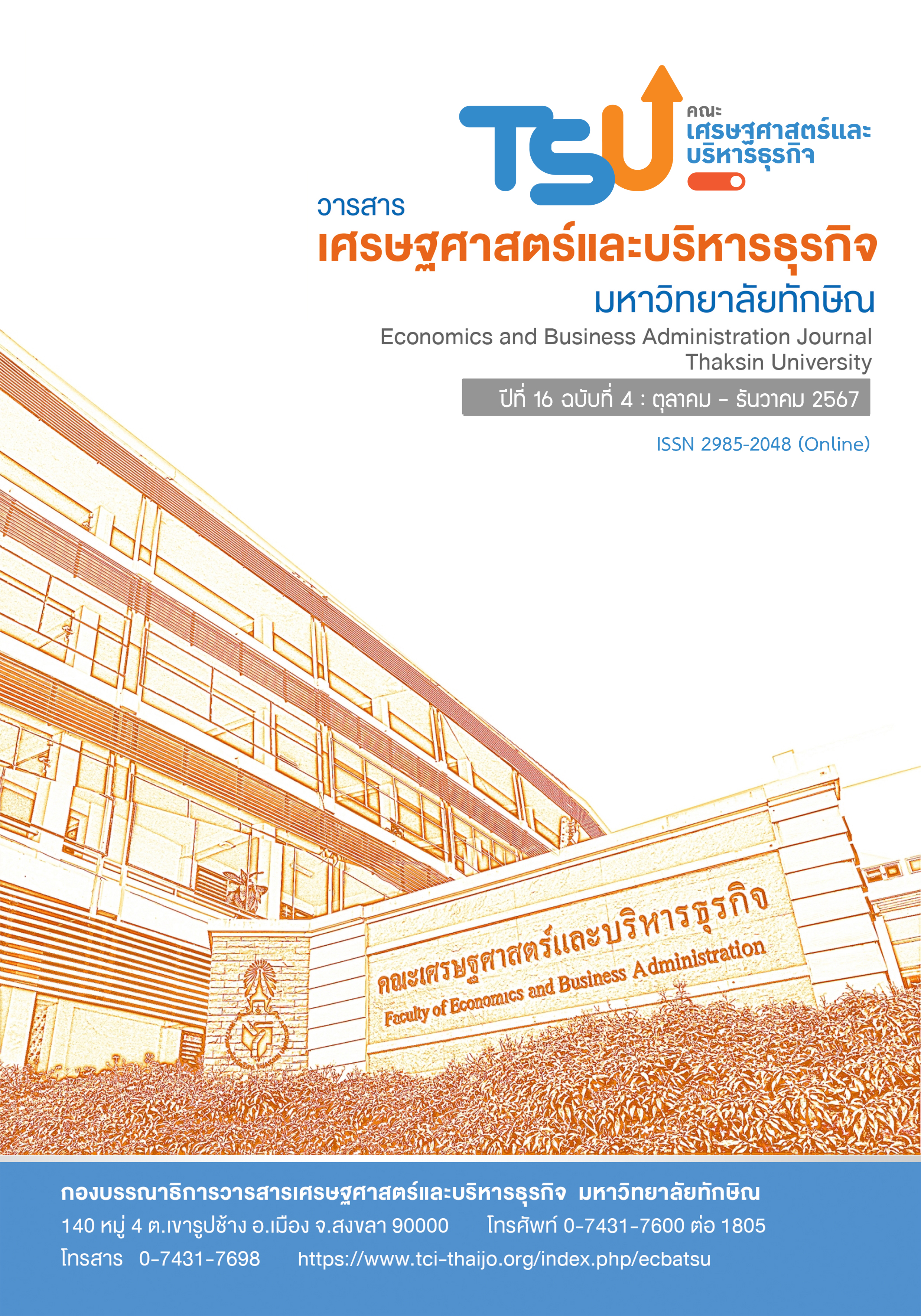ปัจจัยที่มีอิทธิพลต่อการก่อหนี้ของครัวเรือนไทย
DOI:
https://doi.org/10.55164/ecbajournal.v16i4.266508คำสำคัญ:
ภาคครัวเรือน, หนี้ครัวเรือนไทย, การวิเคราะห์การถดถอยโลจิสติกส์แบบทวิบทคัดย่อ
ปัญหาหนี้ครัวเรือนเป็นปัญหาที่สำคัญ เนื่องจากเป็นความเสี่ยงต่อเศรษฐกิจไทยโดยรวม และส่งผลต่อคุณภาพชีวิตของครัวเรือน การศึกษาครั้งนี้มีวัตถุประสงค์เพื่อวิเคราะห์สถานการณ์การก่อหนี้ของครัวเรือนไทย และวิเคราะห์ปัจจัยที่มีอิทธิพลต่อการก่อหนี้ของครัวเรือนไทย โดยใช้ข้อมูลการสำรวจทางเศรษฐกิจและสังคมของครัวเรือน ในปี พ.ศ. 2562 จำนวน 45,586 ครัวเรือน วิเคราะห์ข้อมูลโดยใช้แบบจำลองการถดถอยโลจิสติกส์แบบทวิ (Binary Logistic Regression) ผลการศึกษาพบว่า ครัวเรือนไทยส่วนใหญ่มีวัตถุประสงค์ในการกู้ยืมเพื่อใช้จ่ายอุปโภคบริโภคในครัวเรือน ร้อยละ 7.52 มีความเสี่ยงต่อการผิดนัดชำระหนี้ เมื่อวิเคราะห์ปัจจัยที่มีอิทธิพลต่อการก่อหนี้ของครัวเรือนไทยพบว่า ปัจจัยที่ส่งผลต่อแนวโน้มในการเป็นหนี้ของครัวเรือน ได้แก่ เพศ เขตที่อยู่อาศัย อายุ สถานภาพสมรส จำนวนสมาชิกในครัวเรือนที่มีอายุต่ำกว่า 15 ปี จำนวนสมาชิกผู้พิการในครัวเรือน รายได้เฉลี่ยของครัวเรือน การออม การเป็นเจ้าของบ้านและที่ดิน และสถานะการทำงาน โดยแนวทางในการแก้ไขปัญหา คือ ควรให้ความสำคัญกับการให้ความรู้ทางการเงิน การมีเงินออมสำรองเผื่อเหตุฉุกเฉินเพื่อสร้างภูมิคุ้มกันทางการเงิน มีนโยบายช่วยเหลือทางการเงินแก่ครัวเรือนที่มีผู้พึ่งพิงหรือต้องอุปการะผู้พึ่งพิง ส่งเสริมการออมเงินในระยะยาว และเร่งลดสัดส่วนหนี้เพื่อการอุปโภคบริโภคของครัวเรือน
เอกสารอ้างอิง
Bank of Thailand. Debt Management. Retrived June 30, 2022, from https://www.1213.or.th/PrintPDFList/FCCth_moneymgt_debtmgt_debmgt.pdf
Bualom, W. (2015). Behaviors Influencing Debt Creation by Employees of a Commercial Bank in Chiang Mai Province. Independent study Master of Economics. (Master of Economics). Chiangmai: Chiangmai University.
Budda, L. (2016). Household Debt and Business Cycle in Thailand. Master Independent Study. Bangkok: Thammasat University.
Capital Market Academy (2019). Savings for the Working-age Population. Retrived June 3, 2023, from https://www.cma.in.th/cma/academicPaper/download/2
Chaiphat, C. (2021). The Role of Debt in Financial Health of Thai Households. University of the Thai Chamber of Commerce Journal Humanities and Social Sciences, 42(1), 36-50.
Chaitarin, W., & Kharuhayothin, T. (2019). Debt of Farm Households in Phayao Province. Journal of Community Development and Life Quality, 7(3), 283-294.
Chaiyanon. P., & Sanguanwongse, V. (2021). Debt Analysis and Related Factor to Debt Agriculture of Cooperative Member in the Northern of Thailand. Lampang Rajabhat University Journal, 10(1), 63-75.
Chouyboonchoo, N., Sirichote, O., & Noknoi, C., (2019). Effects of Technology Acceptance and Service Quality on Customer Loyalty for Electronic Banking. Economics and Business Administration Journal Thaksin University, 11(1), 31-52.
Hanphichai, S., Jatuporn, C., & Suvanvihok, V. (2021). The Factors Affecting to The Farmers’ Household Debts in Lopburi Province. Journal of Modern Learning Development, 5(5), 309-320.
Intarawiset, N., Nilbai, T., Thongphat, T., & Antarasena, A. (2022). The Effect of Household Socio-Economic Factors on Household Debt in Thailand. Journal of Management Sciences, 9(1), 115-138.
Jamit, V., & Punturaumporn, B. (2021). Factors Affecting The Increase in Household Debt Burden From The Situation of COVID-19 of People in Bangkok. Retrived June 16, 2022, from https://mmm.ru.ac.th/MMM/IS/twin-9/6214154059.pdf
Jansarikij, S., & Sawangdee, Y. (2013). Factors Associating Informal Debt of The Thai Agriculture Households in Kanjanaburi. Paper presented at The 10th Kasetsart University Kamphaeng Saen Campus Conference, Kasetsart University.
Kabkhao, C., & Sapwarobol, T. (2018). The Determinant of Probability of Household Debt. Paper presented at the 2nd UTCC Academic Day National Academic Conference and Presentation, University of the Thai Chamber of Commerce.
Kanittha, W., Jularad, K., & Pawanid, S. (2014). Household Debt and the Southern Economy. Retrived June 16, 2022, from https://www.bot.or.th/Thai/MonetaryPolicy/Southern/DocLib/Household debt and the southern economy
Karin, K. (2022). Factors Influencing Household Debt Burden During the COVID-19 Situation of Farmers in Sakaeprong Sub-district, Buriram Province. Journal of Multidisciplinary in Humanities and Social Sciences, 5(2), 458-472.
Kengchon, C., Mahujchariyawong, P., & Vacharachaisurapool. (2015). Mitigating of Financing Constraints in the Thai Banking System. Thammasat Review of Economic and Social Policy, 1(1), 95-167.
Khampong, T., Prathumma, K., Chawanasak, N., Petchrattanakul. P., Nuyom. P., Ngarmkoksung. P., Khemanurak. S., Phaksuwan. S., Obthong. S., Tiwawong. N., Kunlamad. S., & Thaweevachiraphat. P. (2022). Factors Affecting non – Performing Loan of Working People in Bangkok. Paper presented at the 58th Kasetsart University Annual Conference, Kasetsart University.
Khunta, C., & Tangtrongpairoj, S. (2021). Thai Household Debts and the Sustainable Solutions. Journal of Liberal Arts and Management Science, 8(1), 131-145.
Lerskullawat, A. (2020). Factors Affecting Household Debt in Thailand. International Journal of Economic Policy in Emerging Economies, 13(4), 327-336.
Money & Banking Magazine. (2023). Thai Household Debt is Still a High Burden. Structural Problems of the Thai Economy. Retrived June 2, 2023, from https://moneyandbanking.co.th/2023/25620
Namput, S., Jaroenjitrkarn, A., & Wiwathana, S. (2014). Strategic Personal Finance Management (6th). Bangkok: Se-Ed book center co., ltd.
Piovarči. V. (2012). The Effect of Socio-economic and Demographic Factors on Household Indebtedness: Evidence from SLOVAKIA. Economic Review, 50(2), 181-202.
Pitak, K. (2019). Factors of People Affecting Thai Household Debt Formation. Master of Economics. Bangkok: National Institute of Development Administration.
Sakulpong, N. (2019). A Study of Financial Skills Affecting the Behavior of Over-indebtedness of Teachers Who are Members of Teacher Savings Cooperative and Others. Master of Economics. Bangkok: National Institute of Development Administration.
Sanguanpan, K. (2015). Get to Know Household Debt. Retrived June 20, 2022, from https://www.bot.or.th/Thai/FinancialInstitutions/Highlights/ASEANCommunity/BankersTalk/Vol3Issue1.pdf
Strzelecka, A., & Zawadzka. D. (2020). Why Households Borrow Money? Socio-Economic Factors Affecting Households Debts: A Model Approach. European Research Studies Journal, 23(2), 820-839.
Sukcharoensin, P. (2021). Have You Started Saving for Emergencies?. Retrived June 3, 2023, from https://www.posttoday.com/columnist/662604
Thammakittikhun, C. (2018). A Good Life Starts with Investment Planning. Bangkok: The Stock Exchange of Thailand.
Tseng, Y., & Hsiao, I. (2021). Decomposing the Factors Influencing Household Debt: The Case of China. Applied Economics, 54(23), 2627-2642.
Tulayasathien, S., Kamlike, J., Wongchiwat, P., Srikam, P., Pattarasangthai,. T., Chombannpraw, N., & Rittiprasart, S. (2015). Modeling Micro-simulation to Study the Role of Household Debt Concerning the Income Inequality of Thailand. Fiscal Policy Office. Retrived June 2, 2023, from https://www.fpo.go.th/eresearch/getattachment/28a10fa1-3d4e-42ca-adb4-5612378fd4ea/7726.aspx
Weeravongtrakool, W., & Osathanunkul, R. (2018). An Analysis of Household Debt Burden in Thailand using Quantile Regression. Journal of Advanced Research in Dynamical and Control Systems, 10(2), 608-613.
Wijaya, A., Zainurossalamia, S. Z., & Darma. D. C. (2020). Life-Cycle Hypothesis for Consumption Pattern: Example from Indonesia. International Journal of Advanced Science and Technology, 29(4), 4712-4720.
ดาวน์โหลด
เผยแพร่แล้ว
รูปแบบการอ้างอิง
ฉบับ
ประเภทบทความ
สัญญาอนุญาต
ลิขสิทธิ์ (c) 2024 Faculty of Economics and Business Administration, Thaksin University

อนุญาตภายใต้เงื่อนไข Creative Commons Attribution-NonCommercial-NoDerivatives 4.0 International License.




